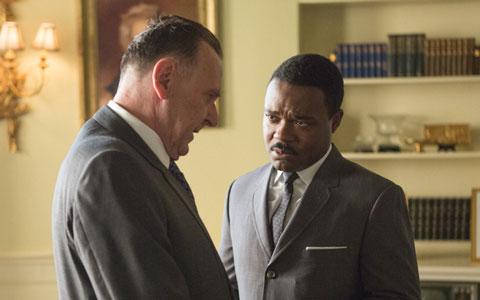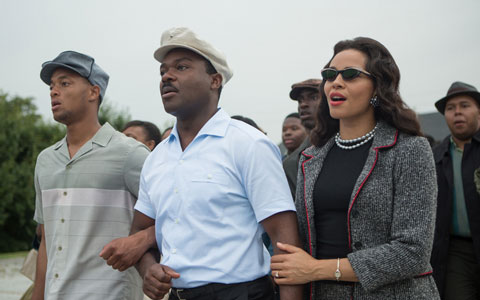The shocking confrontations, the triumphant final march and the passage of the 1965 Voting Rights Act that followed are now an indelible part of history, but the vitally relevant, vitally human story of Selma - from the political battles in the halls of power to the grit and faith of people on the street to the private, inner struggles Dr King (David Oyelowo) faced - has never been seen on the big screen.
This haunting tale of courage is passionately brought to life by director Ava DuVernay, a writer, producer, director and distributor of independent film. Winner of the Best Director Award at the 2012 Sundance Film Festival, DuVernay was honoured with the 2013 John Cassavetes Independent Spirit Award and the Tribeca Film Institute 2013 Affinity Award for her second feature film, Middle of Nowhere.
Built on the solid foundation of British playwright Paul Webb's solid screenplay, DuVernay brings the power of all that went into creating that hard-won moment of long-awaited justice to cinema with an uncompromising immediacy.

The Martin Luther King, Jr seen in Selma is a complex man approaching not only the greatest, and potentially most dangerous, political battle of his life but also a personal crossroads. He's made mistakes, he's weary of battle, he's watched his family suffer for too long - and all of this weighs on him as he tries to hold fast to his principles in the midst of the frightening violence and repression rising in Alabama.
Dr King carries the kind of legend that has daunted many an actor, but David Oyelowo had felt an affinity towards him for years that drove him to seek this part. He might not at first seem an obvious choice. Oyelowo was born in Oxford, England and raised in England and Nigeria before moving to the US in 2007, but he says the minute he read Paul Webb's screenplay in that same year, he knew he would do anything he could to play Dr King. "This role has been a seven-year journey for me," he notes, "but because of having all that time I have also had the chance to truly steep myself in getting to know all that I can about Dr King, the movement and American history as a result."
The film chronicles a string of astonishing historical details, large and small - including the intense, adversarial relationship between Dr King and President Lyndon Johnson, the troubling involvement of the FBI and the unbreakable spirit of ordinary men and women who sacrificed and united around voting rights. But what emerged from these stark details is a vivid tapestry of an American turning point in the making and the stirring journey of a man finding his way through doubts and daunting obstacles towards not just leadership but the togetherness required to make real change in the world.
Says DuVernay, a director who hails from the independent film world and whose family hails from Alabama: "Selma is a story about voice - the voice of a great leader; the voice of a community that triumphs despite turmoil; and the voice of a nation striving to grow into a better society. I hope the film reminds us that all voices are valuable and worthy of being heard."

Given the remarkable fact that no major motion picture to date has focused on any aspect of the life of Dr King, nor on the voting rights movement, DuVernay felt there was a burning need for this story to be told. At the same time, she wanted to strip away the veneer of an untouchable icon and bring Dr King to life as a flesh-and-blood man - a man with flaws and uncertainties, but also with a fortitude and fire that was bolstered by the striving of people around him.
"I do find it surprising and worthy of conversation that, in the 50 years since Dr King's death, there has never been a feature film focusing on him as the protagonist. That's a jaw-dropper," says the director. "It's kind of strange and unfortunate, but I am glad we are here now."
While Dr King's story is central to Selma, DuVernay expands the story outward to the men and women who played crucial roles in building, sustaining and carrying forward the movement. She wanted to lay bare not just these seminal events, but also the rich personal dynamics behind those events.
"We tend to think of King as a statue, or a speech, or a holiday, but he was a man, a man who had complicated relationships, who was very human, and a man who died at the age of 39 fighting for freedoms we all enjoy. I think when you deconstruct the myth of him, you realise that his inner strength is something that all of us have. If we could just tap into it, we could do great things," DuVernay explains.
Though she would be making her first big-budget feature film Ava DuVernay approached Selma with the ambition and vision of a director who felt a magnetic pull to tell this story deep down in her bones.

For DuVernay, the events of 1965 literally hit home because her family hails from Alabama and she spent summers there as a young girl while growing up in Compton. "My father is from a small town called Hayneville in between Selma and Montgomery," the director explains. "That's part of why this story captured me. Previously, I'd been primarily interested in contemporary images of people of colour, but when this story set in the past came into my life, it really took over my imagination in a very unexpected way. And I'm happy it did. It honours the people of Selma, but it also represents the struggle of people everywhere to vote."
Selma underlined for DuVernay how the mere ability to vote can change and uplift communities. "The process that we call justice in this country is directly connected to the right to vote," she observes. "We often take for granted what voting enables us to do, but one of those things is to sit on a jury. So if you are black in 1960s' Alabama and intimidated to the point that you can't even register to vote, that means that you can never sit on a jury to gain justice for yourself or for others like you. The degree to which the right to vote affects the everyday life of people was something I'd never fully processed until I got into the research for Selma."
Intensive research was a necessity, yet DuVernay was searching for more than facts. She wanted to dig into the human centre of the story. Her approach was distinctive: going for a restrained realism that allows the audience to really see the hidden relationships and emotions on the underside of the events.
The film would dig deep into the hearts of, and the community forged by, all the men and women involved. Structured around FBI surveillance reports - the FBI followed Dr King's every move, resulting in a 17,000-page file that traced both the banal and decisive moments of his life - the final screenplay tracked events from the 1963 Birmingham church bombing through the signing of the Voting Rights Act in August of 1965. It also took a kaleidoscopic view, moving through every layer of society, from the presidency to Selma housekeepers, recognising all as connected.
This breadth left the final screenplay open to a multiplicity of interpretations, which excited the filmmakers. "You could read Selma as a story about how governments can sometimes be pushed to act in moral ways. Or it could be said it's a story about protest as a fact of life that is tough and unglamorous," says Kleiner. "It might be an ode to the brilliant strategies and tactics of this group of civil rights leaders. Or it could be a story about the struggle to overcome the enduring doctrine of white supremacy. It's complex and it doesn't have one meaning - it's a story that could feel relevant at any point in history."
DuVernay says she tried to hew to the essence of the events as people who were there remember them. "My approach was to tell the truth as best we could, because the actual facts of what happened, the actual people who were there, are more fascinating than anything you could make up," the director says. "There are no composite characters in this film. Everyone you see in this film really lived, really struggled, really did these things. They are so compelling that there was no reason to make anything up. I leaned into the idea that my role was literally just to be a teller of their tale. I felt I was a translator just trying to get into the inner being of these men and women."
At the same time, she sought a visceral immediacy to connect with today's audiences. "Sometimes you can get dragged down by a historical drama, but this story is also contemporary. It's of now. It's really about something universal that applies to people of different genders, races and religions. We've all been made to feel barriers at some time - and this is a film about people triumphing over barriers."
Having multiple civil rights leaders from that time - including Congressman John Lewis and Ambassador Andrew Young - participate was a source of inspiration. "Just to stand next to people who were so heroic was moving," she recalls. "When you see John Lewis walk in and ask for a Coke, you think: 'Wow, he is just a regular man who did this extraordinary thing.' And that was very important, because the more you realise these heroes were just like us the more you see how amazing what they did was. If you hold them at a historical distance, you can't really feel that, but when you bring them closer, as we try to do in the film, that is when you see the greatness of what they accomplished."
"The thing that's really most exciting to me is that Selma is not just about Martin Luther King, but very much about all the people who made his three months in Selma possible. It's a people's story. King was able to do what he did because he had these people behind him. There was no one else like him, obviously, and he was an amazingly charismatic, spiritually driven, motivated leader, but he still couldn't have achieved these things without the people who stood beside him."
Read more about other films opening this week at www.writingstudio.co.za
